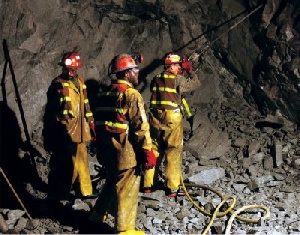The standoff between the Ghana Chamber of Mines and the Office of the Administrator of Stool Lands (OASL) regarding how much should be paid as ground rent by mining companies operating in Ghana has resulted in non-payment of the fees for the last year, Public Agenda can report.
The mining companies are in default to the tune of GHC 19,705,459.96 payable to the 0ASL.
The companies include Gold Fields (GH) Ltd, Ghana Manganese Company, Abosso Goldfields Ltd, AngloGold Ashanti Ltd (Iduapriem), Chirano Gold Mines Ltd, Newmont Ghana Gold Ltd, Newmont Golden Ridge Ltd, Perseus Mining (Ghana) Co. and AngloGold Ashanti (Ghana) Ltd.
The rest are Golden Star (Wasa) Ltd, Golden Star Prestea/ Bogosso, Ghana Bauxite Company Ltd, Adamus Resources Ltd, Noble Gold Mining Co. and Prestea Sankofa Gold Ltd.
These revelations are contained in the Ghana Extractive Industry Transparency Initiative (GHEITI) 2012/2013 Report on the Mining sector. The Report, prepared by Boas and Associates, categorically declares, “None of the selected companies paid ground rent for 2012 and 2013.”
The Ground rent was revised as per the Fees and Charges Amendment Legislation LI 2191 in 2012( became operative in 2013) from GHC 0.50 per square kilometer to GHC 36.50 per acre, translating to GHC 9, 016 per square kilometer.
“This rate is currently under review following a petition from the Chamber of Mines but no payments were made on account pending the rate review,” the Report indicated.
In 2013, mining companies petitioned Parliament in an attempt to get the House to take a second look at what they described as “gargantuan” ground rent imposed on them by OASL.
The companies argued that the decision to upwardly review the ground rent was taken by the OASL without consultation with the mining industry, hence the difficulty in accepting the new rates.
“It's too gargantuan and we are pleading with the Administrator of Stool lands to look at it again.” said Mr Sulemana Koney, the then Director of Analysis, Research and Finance at the Chamber of Mines, in an interview with Public Agenda.
Mr Koney disclosed that the Chamber had petitioned Parliament and copied the office of the OASL to look at ways of reviewing it downwards.
The OASL had predicated its upward review on the fact that the old rate did not make economic sense. It is mandated by Article 267 (2) of the 1992 Constitution and the Office of the Administrator of Stool Lands Act 1994 (Act 481) to collect stool land revenue and to disburse same to the beneficiaries.
Ground rent is the annual payments made by mining and other companies to the owners of the land through the OASL.
They are revised periodically to take care of inflation, the depreciation of the local currency and the price appreciation of the land over time. Usually, the lease agreement stipulates the frequency of the revision. However, on average, rent revisions are of five-year intervals.
The Lead for Mining Schedule at OASL, Dr Gad Akwensivie, indicated that any company that refused to pay the ground rent as prescribed by the law would be deemed as flouting the law and would be dealt with accordingly.
Dr Akwensivie added, “It is a law and every holder of mining right must obey.”
He said: “It is obvious that the review of the rent has been outstanding for over 20 years and you will realise that the last time this was reviewed was sometime in 1986 when it was fixed at 5000 old Ghana cedis, today you will, want to equate that to 50 pesewas.”
Dr Akwensivie told Public Agenda that the process for the review started sometime in 2010 following some pressures from stakeholders and some chiefs.
“In fact we realised that there was the need to do something about it. A team was put together and stakeholders met to review it. So, instead of 50 pesewas, it's now GHC36.60 per acre. This translates into about GHC9”.
Business News of Tuesday, 10 March 2015
Source: Public Agenda
Mining companies owe over Ghc19m Ground Rent
Entertainment












